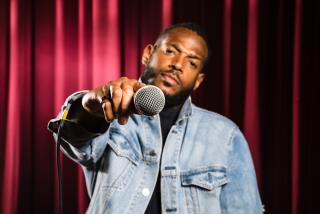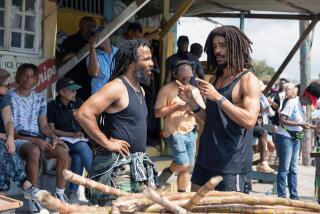POP MUSIC REVIEW : Ziggy Marley Becoming His Own Mon : It hasn’t been easy to escape the shadow of the elder Bob Marley, but Ziggy and his band can still do justice to their legacy with their contemporary vitality.
- Share via
IRVINE — There seems something dishonest to seeing Ziggy Marley perform, though the fault certainly isn’t Marley’s. Instead, as a listener, there is the uneasy sensation that one is trying to cheat death.
Like John Lennon, the late Bob Marley was a visionary, unifying performer who could have accomplished much more had his life not been cut short. But it also couldn’t be argued that the performers didn’t do enough while they were alive.
Asked about a Beatles reunion, Lennon once unleashed his sarcasm, asking if we really needed them to get up on that cross again--weren’t we paying attention the first time?
Perhaps not, for both Ziggy Marley and Julian Lennon have been stuck by listeners with the unenviable task of establishing their own art while cloaked in their fathers’ ghosts.
While the younger Lennon seems to have stumbled under that burden, Ziggy and the Melody Makers’ (featuring other Marley offspring Steve and Cedella Marley and Sharon Pendergast) Irvine Meadows Amphitheatre show Sunday did justice to their legacy while delivering their own music with a contemporary vitality.
While Ziggy’s controlled stage presence couldn’t be confused with the commanding live-wire immediacy of his dad, he nevertheless offered a solid, propulsive set drawn from 1988’s “Conscious Party” and last year’s “One Fine Day” albums.
Lacking the demanding rough edges of the elder Marley, and buoyed by the exuberant youth of the Melody Makers--sisters Cedella and Sharon dance like wildcats on a hot plate--they have reached a larger U.S. audience than their father ever did.
On most of their 14 songs a modern, energetic dance pulse was joined with socially conscious lyrics. Those lyrics weren’t always up to the weight of the subject matter, as on “Black My Story (Not History)” which bit toothlessly at the truncated European view of African history taught in schools. Even Marley’s resurrection of a Haile Selassie speech--a staple of his father’s performances--seemed stilted and flat.
But that was the exception amid the Marleys’ uptown reggae grooves. Backed by a tight seven-piece band, they upped the octane of the album versions of “Tumblin’ Down,” “Look Who’s Dancing,” the unconditional “All Love” and the 1985 track “Reggae is Now.”
The strongest of the original material was “Tomorrow People,” which, with its incantation of “If you don’t know your past, don’t know your future” took on a particular resonance as performed to the largely young audience.
Marley delivered a charged version of the late Marley’s “Get Up, Stand Up” (with brother Steve handling Peter Tosh’s mid-song rap) as well as a goose-bump-inducing encore of the meditative “Redemption Song.”
Opener Eek-a-Mouse has a unique, novel style of toasting (the Jamaican precursor of rap), sounding like a cross between Porky Pig, a tobacco auctioneer and a “Battlestar Galactica” Cylon warrior. But that wore mighty thin over his hourlong set.
While it did get the crowd moving, his syllabic splatter, dead-simple reggae riffs and stork-like stage moves undermined whatever import the lanky singer might have intended for such numbers as “Terrorists in the City.”
Brooklyn’s Family Stand, however, could have easily filled more than the brief 35 minutes they were allotted. With their dance hit “Ghetto Heaven” as the centerpiece of their five songs, the septet offered a strong set of Sly Stone-derived soul and funk, resplendent with heavy bass lines, wah-wah guitars and cat-meow vocals.
More to Read
The biggest entertainment stories
Get our big stories about Hollywood, film, television, music, arts, culture and more right in your inbox as soon as they publish.
You may occasionally receive promotional content from the Los Angeles Times.










